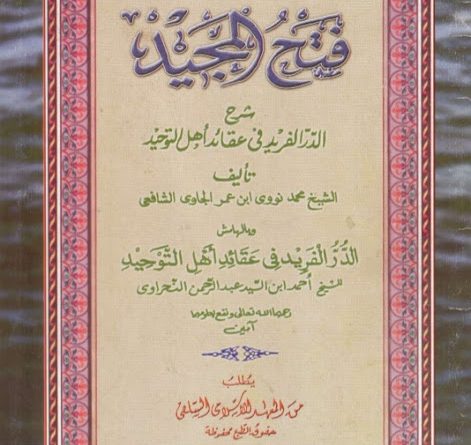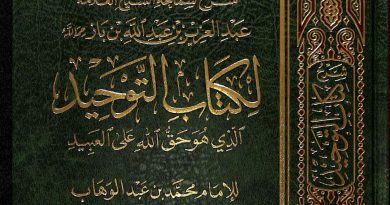Kitaab At Tawheed – Part 6 (Transcribed Class)
بسم الله الرحمن الرحيم
The next hadith in this chapter to establish Tawheed is:
Abdullah Ibn Masoud رضي الله عنه said: “Whoever wants to see the will and testament which is his seal, let him recite the saying of Allah, Most High,
“Say: Come and I will recite to you what your Lord has prohibited for you: …’ This is My Straight Path, so follow it.” [Surah Al-Anaam : 151-153]
Tirmidhi 3070
The Prophet Muhammad صلى الله عليه وسلم did not leave any special commandment or Wasiyyah (advice) to anyone before his death. This hadith means that anyone who wants to know what was the Wasiyyah of the Prophet صلى الله عليه وسلم to us in general terms. Meaning, if you want to know about your religion and what the Prophet صلى الله عليه وسلم commanded and advised us with, then you need to abide by these verses (151-152) of Surah Al-An’am. This is because these verses encompass all the religion; they start with Tawheed and include being good to parents, being just in all dealings and to abide by the Haqq. They also command us to the straight path which Allah established through His legislation and revealed books. This is the only path which will connect us to Allah.
The Next Hadith :
Mu’adh ibn Jabal رضي الله عنه reports, ‘I was riding double behind the Prophet صلى الله عليه وسلم on a donkey. He asked me, “Mu’adh, do you know what Allah’s right upon the servants and the servant’s right upon Allah is?” I said, “Allah and His Messenger know best.’ He said , “Allah’s right upon the servants is that they only worship Him without associating anything with Him. The servant’s right upon Allah is that He not punish anyone who does not associate anything with Him.” I said, “Messenger of Allah, should I not convey this great news to the people’ He said, “No, for they would (overly) rely upon it.”
Sahih Bukhari and Muslim
(Mua’adh Ibn Jabal رضي الله عنه is from “Al-Ansar” and he has a very special virtue: he was very knowledgeable. The Prophet صلى الله عليه وسلم said “on the Day of Judgment Muadh Ibn Jabal will lead the scholars.)
In this Hadith, the Prophet صلى الله عليه وسلم said the Right of Allah upon us is to worship Him alone and not to associate anyone with Him, we direct all our acts of worship (such as praying, slaughtering, supplicating, charity) to only Allah, and it is upon Allah (meaning Allah obligated upon Himself) not to punish those who never associated anything with Him.
So, what about a man who is upon Tawheed and commits adultery, did he associate anything with Allah here? Has he committed Shirk? The answer is yes, but this is not a Shirk of worship, rather it is a minor shirk meaning he has associated his own desires with Allah, and he chose to obey his lusts instead of obeying Allah.
Allah says:
{أَفَرَءَيۡتَ مَنِ ٱتَّخَذَ إِلَـٰهَهُ ۥ هَوَٮٰهُ}
Have you seen him who takes his own lust (vain desires) as his ilâh (god)? [Surah Al-Jathiya: 23]
That’s why Shaikh Uthaymeen says that the Prophet صلى الله عليه وسلم directed Mua’adh ibn Jabal رضي الله عنه not to tell people about this hadith because some people would rely on this glad tidings (bushra) without acting upon what it required from fulfilling the rights of Tawheed. Shaikh Uthaymeen says that worshipping Allah alone without associating anything with Him necessitates that the person refrains from any type of disobedience, and if a person falls into sins (as all human falls into sins) he has to repent in order to complete his tawheed again.
So we need to understand that Tawheed has rights to be fulfilled and one of these rights is to obey Allah alone.
After each chapter the author, Shaykh Muhammad ibn Abdul Wahhab, summarises the important matters covered in order to refresh our memory and make sure we understand them clearly.
These are the important matters covered in this first chapter:
First Matter: The wisdom of the creation of Al Jinn and humankind. Meaning, the purpose of our creation is to fulfil our Tawheed.
Second Matter: Worship is Tawheed
We mentioned some scholars have said that إِلَّا لِيَعۡبُدُون (to worship Allah alone) means إِلَّا لِيُوَحِّدُون (to single Allah alone in worship). Any Ibaadah (worship) is built upon Tawheed therefore no ibadah will be accepted unless it is built upon Tawheed. Here the author means that Ibadah (i.e. prayer, fasting, charity) will not be accepted unless it is based upon Tawheed. For example, if a man commits shirk and he then prays one thousand rakat in a day, none of them will be accepted.
Allah stated this in many verses..
وَمَا مَنَعَهُمۡ أَن تُقۡبَلَ مِنۡہُمۡ نَفَقَـٰتُهُمۡ إِلَّآ أَنَّهُمۡ ڪَفَرُواْ بِٱللَّهِ وَبِرَسُولِهِۦ
And nothing prevents their contributions from being accepted from them except that they disbelieved in Allâh and in His Messenger (Muhammad صلى الله عليه وسلم). [Surah At-Tawba: 54]
Disbelief was a reason for their charity not being accepted. Therefore, Ibadah (worship) is based and built upon Tawheed and without Tawheed any act of worship has no value and it is nullified.
Third Matter: (أن من لم يأت به لم يعبد الله، ففيه معنى قوله :(ولا أنتم عابدون ما أعبد)-
Whoever does not meet the requirements of Tawheed has not worshipped Allah. This is the intended meaning when Allah says:
وَلَآ أَنتُمۡ عَـٰبِدُونَ مَآ أَعۡبُدُ (٣)
“Nor will you worship that which I worship. (3)
The worship of the kuffar (unbelievers) in Makkah was based upon shirk whereas our worship is based upon Tawheed (“Your worship is different from my worship”).
Fourth Matter: The wisdom behind sending the Messengers.
وَلَقَدۡ بَعَثۡنَا فِى ڪُلِّ أُمَّةٍ۬ رَّسُولاً أَنِ ٱعۡبُدُواْ ٱللَّهَ وَٱجۡتَنِبُواْ ٱلطَّـٰغُوتَۖ
And verily, We have sent among every Ummah (community, nation) a Messenger (proclaiming): “Worship Allâh (Alone), and avoid (or keep away from) Tâghût[] (all false deities, etc. i.e. do not worship Tâghût besides Allâh).” [Surah An-Nahl – 36]
To guide us to worship Allah alone and to keep away from Taghut (everything that is worshipped besides Allah).
Fifth Matter: The message was delivered to every nation.
Messengers were sent to all the nations (as the above verse informed us).
Sixth Matter: The religion of all the Prophets is one.
All the messengers came with one same message: Islam and Tawheed.
وَمَآ أَرۡسَلۡنَا مِن قَبۡلِكَ مِن رَّسُولٍ إِلَّا نُوحِىٓ إِلَيۡهِ أَنَّهُ ۥ لَآ إِلَـٰهَ إِلَّآ أَنَا۟ فَٱعۡبُدُونِ (٢٥)
And We did not send any Messenger before you (O Muhammad صلى الله عليه وسلم) but We revealed to him (saying): Lâ ilâha illa Ana [none has the right to be worshipped but I (Allâh)], so worship Me (Alone and none else).” [Surah Al-Anbiya :25]
Therefore, the religion is only one although the legislation could vary between messengers ( i.e. in the way we pay zakat, we get married, we fast etc) however the Aqeedah and Tawheed was always the same.
Seventh Matter: The great matter that worshipping Allah can only be established by rejecting the “Taghut” which is all that is worshipped besides Him.
For example, if someone directed all of his acts of worship to Allah yet he did not negate and free himself from Taghut (associates of Allah), then this person is not considered from the people of Tawheed even though he directed all his acts of worship to Allah. This is because he did not fulfil the second condition of shahada (negating the Taghut).
The shaykh mentioned this important matter because he wants us to understand and be aware of the true meaning of the Shahada (the testimony of faith). Many people are ignorant about this, they think that there is nothing wrong if they approve other religions besides Islam such as Buddhism or Christianity.
Eight Matter: Taghut is a generic term that includes everything that is worshipped besides Allah.
Ninth Matter: The great importance of the three unequivocal verses of Surah Al-Anaam.
These great verses of Surah Al-Anaam starting from 151 to 153 encompass all the religion. We need to understand and ponder upon these verses and see where we are from in acting upon them.
Tenth Matter: The indisputable verses of Surah Al-Isra.
Allah states at the end of Surah Al-Isra that if you associate in worship anyone besides Him then Jahannam will be your eternal abode in the next life and you will experience a severe punishment.
Eleventh Matter: the verses of Surah Nisa’ which is also called the ‘Verse of the Ten Duties’, Allah begins it by saying:
واعبدوا الله ولا تشركوا به شيئاً
Worship Allah and do not associate anything with Him.
[Surah An-Nisa – 36]
So Allah starts with the right of Tawheed and all the other rights will not benefit you unless you fulfil the first one correctly.
Twelfth Matter: The advice of Abdullah Ibn Masoud رضي الله عنه regarding the will of the Messenger of Allah صلى الله عليه وسلم: any one who desires to learn and implement the religion of Allah he needs to abide the verses of Surah Al-An’am (151-152)
Thirteenth Matter: Knowing Allah’s right upon us: To single Him out in worship.
Fourteen Matter: Knowing the servants right upon Allah if they fulfil His right: Allah will not torture or punish anyone who will not associate anyone or anything with Allah and this also includes our own desires. This is the promise of Allah and its fulfilment is guaranteed.
Fifteenth Matter: This hadith reported by Mua’adh Ibn Jabal رضي الله عنهwas unknown to most of the Companions, he (Muadh Ibn Jabal) recited this Hadith because he was afraid to die being sinful of hiding knowledge, so he narrated it before his death to the people.
Sixteenth Matter: The permissibility of withholding knowledge for an overriding benefit.
So that’s why the Shaikh mentions that in some cases, it is allowed to hide knowledge from people when the end result is a religious benefit. In this case the Prophet صلى الله عليه وسلم kept away this hadith from the Sahaba because he was afraid they would rely on the mercy of Allah and leave acting upon fulfilling the rights of Tawheed.
Seventeenth Matter: The recommendation of giving good news to a Muslim so as to delight him.
One of the most beloved acts of worship by Allah is to please a muslim and make his heart happy again, this is from the beauty of Islam. That’s why when Mua’adh رضي الله عنه heard the the hadeeth (of the right of the servants upon Allah) he said: “shall I go and give this glad tiding to the people?” knowing that this hadith would please the companions. The eagerness to say something that will please people and give glad tidings, it is from Islam, it is requested. Shaikh Uthaymeen says we take from this benefit that we should as Muslims make an effort to try and bring pleasure to Muslims, make them happy and bring pleasure to their lives. This can be done by saying good and encouraging words, helping with money to solve their difficulties or maybe bringing a nice gift.
If you care to do this, this will bring you a lot of goodness, easiness and peacefulness, your heart will be pleased and subtle. Allah is Thankful, He will thank your acts by bringing happiness and contentment to your heart. Any goodness you bring to a muslim will benefit you more, and will be a reason for receiving the mercy of Allah. The point exactly, the Sheikh mentioned is that since we are requested to bring pleasure to people to Muslims then we should refrain from bringing sadness to Muslims and try not to make them upset as much as you can.
Eighteenth matter: The fear from relying upon the mercy of Allah without taking by the means.
Nineteenth matter: If a person doesn’t know a matter he should say “Allah knows best”.
End of the explanation of Chapter 1 of Kitaab At Tawheed: “I have not created jinn and mankind except to worship me alone” .
This is a edited transcribed class given by Zayneb al Kateb to her students. To join please visit (ONLY SISTERS)


